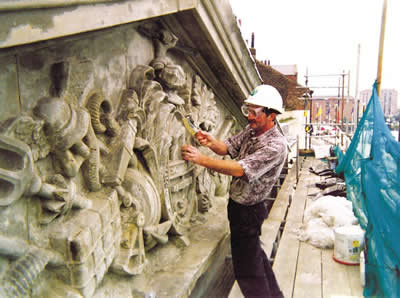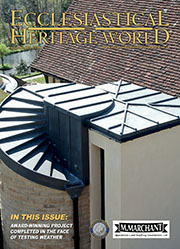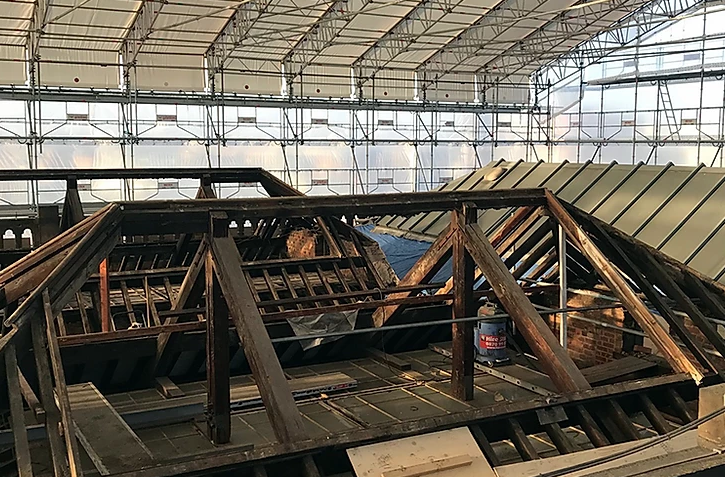Heritage Roofing
Heritage roofing - maintaining our iconic buildings
The UK is home to some of the most iconic buildings in the world, from stunning churches and cathedrals to historic stately homes. Each and every one of these remarkable feats of architecture requires regular maintenance to ensure they remain in the very best condition, allowing them to be enjoyed for generations.
Lightning Protection
When lightning strikes are you protected against this act of God?
The issue of lightning protection in churches is one that has exercised this publication for many years. In this four-part series of spotlights on the issue we will be revisiting various aspects of the subject, beginning with an overview of current thinking.
Traditional Lime
Lime: it’s better for buildings – and for the environment
It is now fairly well known that cement is not good for old buildings and that lime mortar should be used. But why? What are the advantages and what are the disadvantages? In order to begin to answer those questions it is necessary to understand the nature of traditional building, the process by which buildings used to be built, and how it differs from modern construction, the process by which we build today.
Audio Visual
Audio visual equipment in church buildings
This guidance is issued by the Church Buildings Council under section 55(1)(d) of the Dioceses, Mission and Pastoral Measure 2007. As it is statutory guidance, it must be considered with great care. The standards of good practice set out in the guidance should not be departed from unless the departure is justified by reasons that are spelled out clearly, logically and convincingly.
Read More...
CRE Events
All change at CRE: the UK’s ‘ideal church show’
The Christian Resources Exhibition (CRE), the UK’s largest church-related show, has changed hands in its 40th year and has been taken over by Quartz Business Media.
Insurance
You need to ensure that reasonable precautions are in place at your church to keep it safe for those who use it. To do this, you need to think about what might cause harm to people.
You will then need to decide if the precautions already in place are adequate. If they are not, you may need to identify further action to prevent any danger. When done formally, this is known as a risk assessment.
LPOW Grants
£23 million government package to support restoration of thousands of listed places of worship
Heritage Minister Sir Chris Bryant has announced that the Listed Places of Worship Grant Scheme will be extended into the next financial year, providing £23 million so that thousands of historical buildings, including churches, synagogues, mosques and temples, can carry out restoration work.
Lead Roofing
Lead is one of the oldest materials in the roofing industry and is still commonly used throughout the world today.
Lead roofing is a traditional roofing method which has been used in the industry for hundreds of years, and is therefore proven to be extremely reliable. Lead roofing, and sand-cast lead, in particular is ideal for old buildings such as churches or historical renovations, whereas milled lead roofing is a mass-produced alternative, used for precision and accuracy in homes and commercial buildings alike.
Home
Choosing a Tradesman, A Guide from the Guild of Master Craftsmen
Before choosing a tradesman
There are a few things that you should consider and some questions you need to ask.
- Are they members of a trade association like The Guild of Master Craftsmen?
Check their credentials, The Guild provides a free checking service for customers to validate a tradesman's claim to membership www.findacraftsman.com Using a Guild member gives you access to a free conciliation service if problems arise. - Contact
Does your chosen craftsman have an address and landline telephone or simply a mobile number. You should be very careful of employing a workman of any sort that is unable to provide a home or business address and a landline. - What work exactly do you want doing?
Write down a description of what work you want undertaking in as detailed a way as you can. The more you have straight in your mind about the work you want done, the more likely that you will be able to describe it to your chosen tradesman. Obtain a specification and drawings of the planned work. - How much will it cost?
Get at least two, preferably three, written quotations from different firms for the job. An estimate is different and is simply often a rough guess on how much something will cost. A quotation will give you a fixed price which you have in writing, If you provide a specification and drawings for the work, you can be sure the quotes you receive will be on a like for like basis. - Is VAT included?
Ask whether VAT has been included or not? This can often be a nasty shock if not planned for. - Changes
Make sure all changes in the brief are in writing and the new quotation received and approved before work starts. - Are Local Authority approvals required?
Planning Permission? Building Regulation approval? - Neighbours
Does the work you are planning affect neighbouring properties? If so it can save an awful lot of problems if you speak to them about what you are doing before any work starts, especially if the 'party wall act' is an issue with the work planned. - Is your chosen company qualified and capable of carrying out the work?
Make sure you check the company's qualifications and experience of carrying out similar work. Ask to see references from other satisfied customers - How long should the work take and when can they start?
If it is a big job, make sure you get start and completion dates in writing. - Do they give any guarantees?
Ask if the work is covered by a guarantee, how long the guarantee lasts and whether it is backed by insurance so that, should the company cease trading, any defects will still be remedied. An insurance-backed warranty is desirable, especially if the job is a big one - Do they give you confidence?
Think about how a company responds to your enquiry; did they turn up on time, how well did they listen to find out what you need to have done, how carefully did they survey and measure? Ask when you can expect the quotation and check whether it arrives on time. - Is the price acceptable?
If the quotation from your preferred company seems high it is worth talking to them to see if there is any way the price could be reduced. Ask for any revised price and specification in writing. - Never pay the whole amount up front
Always keep a percentage of the cost back until it's finished and you are happy. - Be careful about who you are paying
Always pay the company doing the work and never the individual person UNLESS the company is owned and run by an single individual. This is often the case with the many smaller companies that exist in the UK but it is worth checking with tradesman. - Get an invoice that includes the VAT
Make sure your invoices are accurate and itemises the VAT separately. - Always get a receipt for every payment you make - getting a receipt is fundamental, without receipts you have no proof of payment

When you accept the quotation
- Agree in writing when the work is to be carried out
- Check again how long it will take, what time they will arrive and leave and if they will come every day until the job is complete.
- If the work is inside your home, check whether you need to remove any furniture or carpets and curtains. Ask what safeguards will the company make to protect your home? Do they have Public Liability cover and for how much?
- Check whether a deposit is required and when final payment is due, it is always preferable to leave money outstanding until the job has been completed. Be sure to obtain written receipts for all payments.
When work starts
If any changes are required to the original specification, discuss it with the tradesman and give written instructions. Request a revised quotation.
Log on to www.findacraftsman.com to check for free if your craftsman is a current member. All our members have passed rigorous assessment by us and have been recommended by their previous customers.

More information from http://www.guildmc.com and try the link to the Guild of Master Craftsmen Directory on this website to find a selection of members for the Church and Heritage sector




















